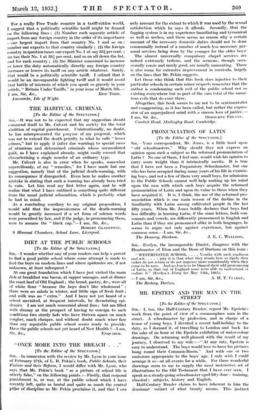PRONUNCIATION OF LATIN
[To the Editor of the SPECTATOR.] SIR,—Your correspondent, Mr. Jones, is a little hard upon " old schoolmasters." Why should they not express an opinion upon such a subject as the reformed pronunciation of Latin ? No one of them, I feel sure, would wish his opinion to carry more weight than it intrinsically merits. It is true that I have not been a Preparatory Schoolmaster, but one who has been occupied during many years of his life in examin- ing boys, and not a few of them very small boys, for admission to the Public Schools cannot well help making up his mind upon the ease with which such boys acquire the reformed pronunciation of Latin and upon its value to them when they have acquired it. It is, I think, the use of the reformed pro- nunciation which is one main reason of the decline in the familiarity with Latin among cultivated people in the last fifty years. When Mr. Jones boldly declares that boys find less difficulty in learning Latin, if the same letters, both con- sonants and vowels, are differently pronounced in English and Latin than if they are pronounced alike in both languages, he seems to argue not only against experience, but against colnmoau sense.—] am, Sir, &c., The Deanery, Durham. J. E. C. WELLDON.
SIR,—Evelyn, the incomparable Diarist, disagrees with the Headmaster of Eton and the Dean of Durham on this issue :
" WESTMINSTER SCHOOL . . . . Youths with such readiness and wit pity it is that what they attain here so ripely they either do not retain or do not improve more considerably when they come to be mon. And no less is to bo blamed their odd pronouncing of Latin, so that out of England none were able to understand or endure it" (Evelyn's Diary for May 13th, 1661).
The Rectory, Devizes.


















































 Previous page
Previous page